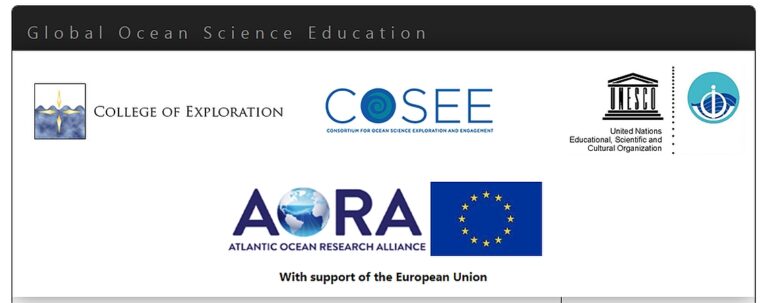Registration is now open for the 2019 Global Ocean Science Education Workshop to be held from November 13-15 in Reston, VA. The steering committee has been busy selecting speakers and panelists from around the world, representing the ocean science research, education, business, and policy communities.
We hope you can join us for this exciting meeting, which will focus on planning for the U.N. Decade of Ocean Science for Sustainable Development and have specific themes of Ocean Observation, Seabed Mapping, and the Engagement of Business and Industry. Registration will be limited to the first 120 registrants
The 2019 GOSE Workshop is being conducted by COSEE, the College of Exploration, the Atlantic Ocean Research Alliance, and Seabed 2030 in partnership with the Intergovernmental Oceanographic Commission.
Registration information and a draft agenda can be found on the GOSE Workshop Website.
Overview
The Global Ocean Science Education (GOSE) Workshops, facilitated by the international
Consortium for Ocean Science Exploration and Engagement (COSEE) and the College of
Exploration (CoE), bring together ocean scientists, education professionals, business and industry leaders, and decision makers from across the globe to foster international collaboration and partnerships and advance ocean science education and ocean literacy. The GOSE workshops also provide a forum to address ocean science issues and challenges that cross national borders.
The ​GOSE ​Workshop ​is ​the ​only ​platform ​of ​its ​kind, ​bringing ​together ​the ​ocean ​science, ​education, ​policy, ​and ​business ​sectors ​to ​improve ​ocean ​science ​education ​across ​the ​globe.
2019 GOSE Workshop
The 2019 GOSE Workshop will be held in the Washington, DC area from November 13-15. The venue is 15 minutes from Washington D.C. International Airport Dulles (IAD) . The workshop site will be the American Society of Civil Engineers https://www.asce.org/ Conference Center https://www.asceconferencecenter.com/ in Reston, Virginia. Reston is a 50 minute metro ride to the center of Washington D.C.
A main 2019 GOSE Workshop goal is to build stronger connections and professional working relationships throughout the global ocean science research, education, and business communities as it focuses on three main themes:
• Global Ocean Observing
• Seabed Mapping
• Meeting the Needs of Business and Industry
Keynote presentations, panel discussions, and participant interactions will focus on the
integration of the 2019 GOSE Workshop themes with K-12, undergraduate and graduate, and
public education, including education in support of the Blue Economy. Discussions will also
identify how workshop themes will support and contribute to the United Nations
Decade of Ocean Science for Sustainable Development (2021-2030).
Specific Workshop goals include:
• Bringing together the ocean science, education, policy, and business/industry sectors;
• Fostering the integration of research results from the seabed mapping and ocean observing
communities into education resources for enhanced ocean literacy and decision making; and
• Identifying business and industry needs that will lead to the development of an international
certificate course for business leaders and policymakers.
History of the GOSE Workshops
Previous GOSE Workshops have identified and built consensus related to three major priorities
for international collaborative ocean science education efforts:
• The Ocean and Human Health, including Coastal Resiliency;
• The Ocean’s Role in Climate Change and the Effect of Climate Change on Ocean Systems; and
• Biodiversity, including Food Security & Fisheries.
Priorities have also been identified for ocean science topics to be integrated into ocean science
education initiatives:
• Climate Change and Weather
• Loss of Biodiversity
• De-oxygenation of Coastal Waters
• Microplastics/Pollution
• Ocean Stressors
Process priorities have been identified for the global ocean science education community:
• Communication and teaching training for scientists and graduate students;
• Education and resources for business and industry and decision makers;
• Reform of undergraduate ocean science education with special emphasis on identifying
workforce needs and educating for Blue Economy careers;
• Support for ongoing global ocean literacy efforts;
• Increasing diversity in ocean science; and
• Establishment of a network of networks to support international ocean science initiatives.
GOSE Workshop participants develop strategies to:
• Conduct ocean science research that benefits society;
• Develop catalytic partnerships between ocean science sectors;
• Foster communication and coordination among ocean science education programs;
• Promote ocean science as an interdisciplinary tool for improving science education and
decision making; and
• Foster strategies to increase the participation of students from populations that are underrepresented
in the ocean sciences.
Collaborative international efforts, resulting from previous GOSE Workshops, have included a
side event, Ocean Literacy for All, that was conducted during the first United Nations (UN)
Ocean Conference at UN Headquarters in 2017. Priorities identified in previous workshops have
also been addressed by the Intergovernmental Oceanographic Commission with support from
the Swedish Ministry of the Environment and Energy.

